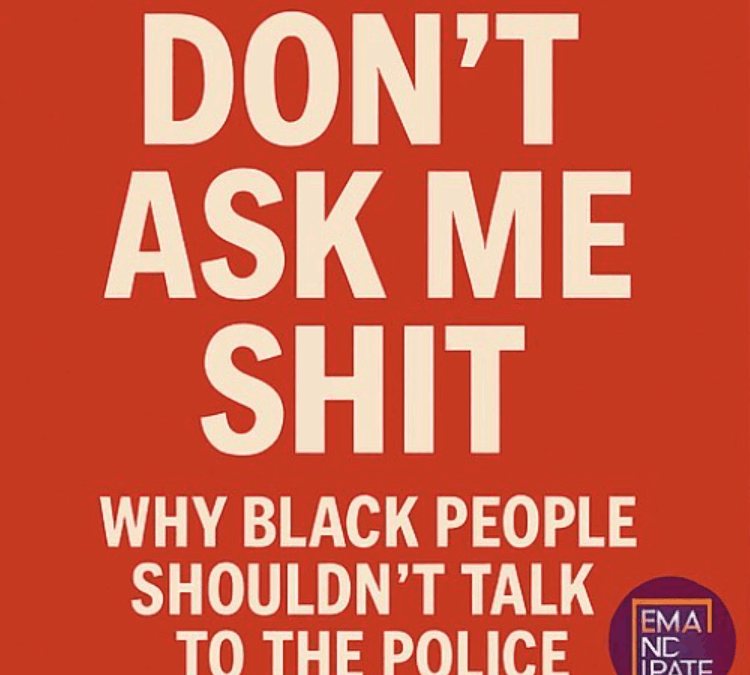The police are not broken. They’re doing exactly what they were designed to do: protect property, enforce white supremacy, and crush resistance. For Black people, especially those who understand our struggle through a revolutionary lens, talking to the police is not just dangerous—it’s counterrevolutionary. From slave patrols to modern-day militarized police forces, law enforcement has always been the armed wing of the state, waging war on Black autonomy, dignity, and survival.
This essay isn’t about individual cops. It’s about the system—how it was built, how it operates, and why silence is not just a legal right but a political stance.
I. Policing as Counterinsurgency: Born to Catch Runaways
Policing in the U.S. emerged not to protect communities, but to protect capital and control labor—especially Black labor. In the South, police forces grew from slave patrols tasked with capturing Africans who fought for their freedom. In the North, they evolved alongside industrial capitalism, created to crush labor strikes and suppress the poor.
From the start, the police have functioned as agents of domestic occupation. The so-called “peace” they protect is the peace of plantations, prisons, and profit. Black resistance—whether escape, rebellion, or organizing—was treated as insurgency. And talking to the police? That was how the state cracked our movements from the inside.
II. Reconstruction to Jim Crow: Legalizing White Terror
The end of slavery didn’t end police violence—it formalized it. During Reconstruction, Black Codes were used to re-enslave Black people through criminalization. Police were enforcers of these codes, arresting Black folks for being “idle,” “disorderly,” or simply free.
As the U.S. capitalist economy transitioned from plantation slavery to prison labor, police ensured the continuity of Black exploitation. The prison-industrial complex was born from this legal lynching, and silence became a necessary tactic for survival. In this era, talking to the police often meant talking your way back into a chain gang.
III. Civil Rights and COINTELPRO: State Repression in Uniform
During the Civil Rights and Black Power movements, the police played their most honest role: foot soldiers of the state. They beat, jailed, and assassinated those who dared to challenge racial capitalism. Whether it was Malcolm, Assata, or Fred Hampton, the message was clear: if you organize for Black liberation, the state will respond with deadly force.
COINTELPRO was the FBI’s secret war on Black radicals. It relied heavily on informants—people coerced or convinced to talk. Talking to the police during this era didn’t just risk jail—it risked betrayal, fragmentation, and death. Silence wasn’t passive. It was defense.
IV. Mass Incarceration and the Modern Plantation
The so-called “War on Drugs” was never about drugs. It was a war on the Black working class. Reagan, Bush, Clinton—all escalated this war with bipartisan support. The result? Millions incarcerated, entire communities destabilized, and an economy built on cages.
Police, armed with military equipment and surveillance tools, flooded Black neighborhoods. Cooperation didn’t keep you safe—it got you caught. Snitching didn’t bring justice—it fed the machine. The prison-industrial complex thrives on broken silence.
V. The Law Ain’t for Us: The Fifth Amendment as Shield
The law is not neutral. It was written by and for property-owning white men. Black people navigating this system are entering enemy terrain. Police are trained to lie, manipulate, and extract confessions—especially from the poor, the young, and the vulnerable.
The Fifth Amendment—the right to remain silent—is one of the few legal shields we have. And it must be used relentlessly. Every word given to the police is a bullet in their chamber. “Don’t ask me shit” isn’t just an attitude—it’s a survival strategy in a system that sees us as suspects, not citizens.
VI. Revolutionary Refusal: No Snitching, No Trust, No Cops
“No snitching” is not about ignoring harm—it’s about refusing to legitimize a system that has never protected us. It’s a political stance rooted in centuries of betrayal. From the fields to the hood, we’ve known that justice doesn’t come from cops—it comes from community, accountability, and struggle.
Radical movements have always built alternatives. The Deacons for Defense, the Black Panther Party, Copwatch collectives, and modern abolitionist orgs all reject cooperation with police. They build safety outside the state. They organize, educate, and protect.
VII. Conclusion: Abolition Demands Silence
Talking to the police props up a system that must be dismantled. It diverts energy from abolitionist vision and empowers the state to keep punishing Black life. Every revolutionary—from Harriet Tubman to George Jackson—understood this.
We don’t talk to cops not because we’re hiding something, but because we’re fighting something. We’re fighting for a world where Black life is sacred, not surveilled.
So next time they knock on your door, remember the ancestors:
“Don’t ask me shit.”
